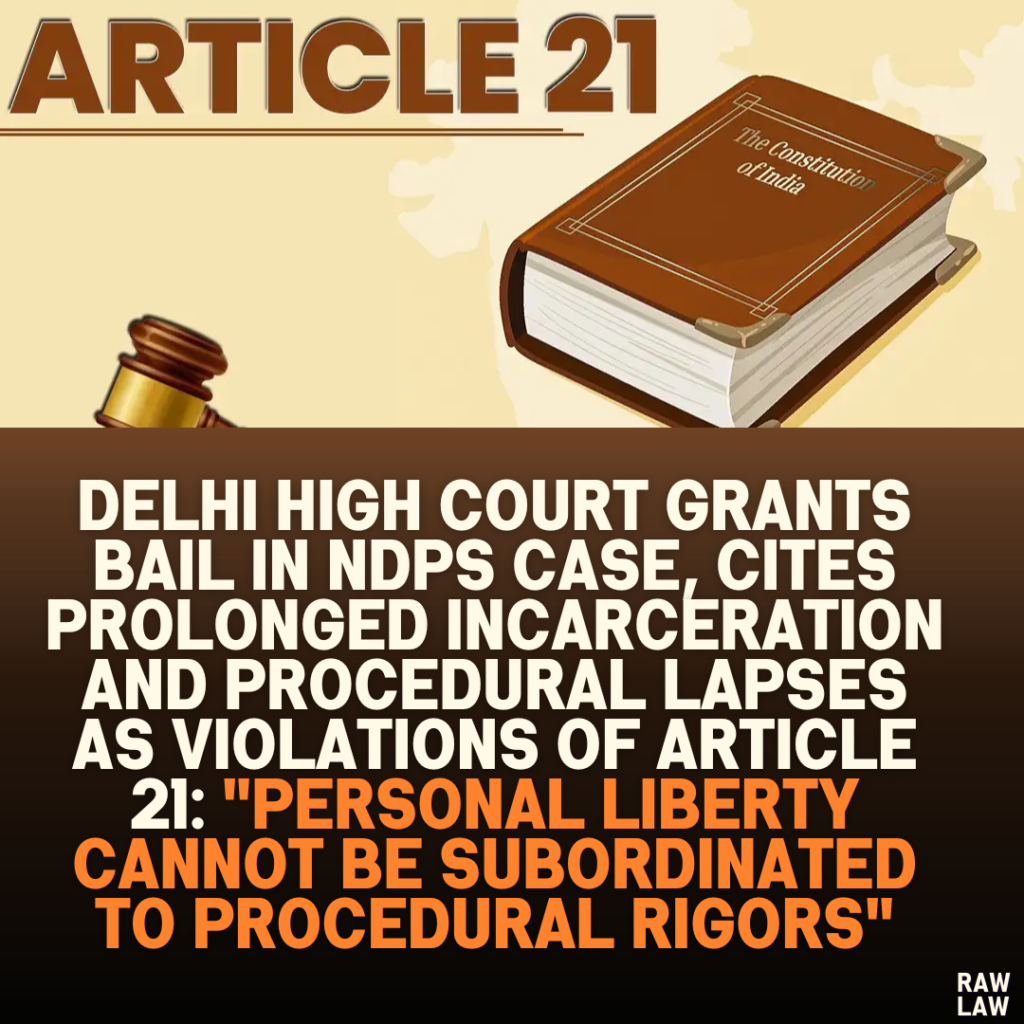Court’s Decision
The Delhi High Court granted bail to the applicant accused of possession of commercial quantities of heroin under the NDPS Act. The Court concluded that procedural irregularities, lack of independent witnesses, and an improbable narrative of events created reasonable doubt about the prosecution’s case. The decision also emphasized that prolonged incarceration violated the applicant’s fundamental rights under Article 21 of the Constitution, which guarantee personal liberty.
Facts
- Alleged Incident: On September 1, 2022, during surveillance in Rohini, Delhi, police intercepted a white Creta car suspected of illegal activities. The driver and the passenger, later identified as the applicant and a co-accused, allegedly attempted to flee, carrying black polythene bags.
- Seizure:
- The co-accused was reportedly carrying a bag containing 400 grams of heroin.
- The applicant discarded a bag containing 945 grams of heroin.
- Both were apprehended, and the contraband was seized and tested on-site, confirming the presence of heroin.
- Investigation:
- The applicant and co-accused disclosed details of a narcotics syndicate involving other individuals.
- The applicant has been in custody since September 2, 2022, with no evidence linking him directly to financial or telecommunication transactions related to the narcotics.
- Trial Progress:
- Over two-and-a-half years, only two out of 25 witnesses have been examined.
- The trial’s conclusion remains distant, with the next hearing scheduled for February 18, 2025.
Issues
- Does prolonged incarceration without trial amount to a violation of the applicant’s fundamental rights under Article 21?
- Do the procedural irregularities and lack of corroborative evidence raise sufficient doubt to justify bail under the stringent conditions of Section 37 of the NDPS Act?
Petitioner’s Arguments
- Prolonged Detention:
- The applicant has been in custody for over two-and-a-half years without substantial trial progress.
- Such delays infringe upon the applicant’s right to personal liberty under Article 21.
- Improbable Narrative:
- The prosecution’s claim that the accused stopped the car voluntarily in front of police personnel and exited with contraband was illogical and highly improbable.
- Lack of Evidence:
- There were no independent witnesses to corroborate the police’s version of events.
- No direct financial transactions or call records linked the applicant to the narcotics operation.
- Procedural Lapses:
- Contradictions in descriptions of the contraband raised doubts (e.g., the FIR described it as “clay-colored,” while forensic reports called it “reddish-pink”).
- Delayed submission of forensic reports further undermined the investigation.
- Previous Involvement Misrepresentation:
- The prosecution’s claim of prior involvement was disproven, as the applicant was acquitted in an earlier case in 2018.
Respondent’s Arguments
- Commercial Quantity:
- The recovery of heroin was above the commercial threshold, invoking the strict bail provisions of Section 37 of the NDPS Act.
- Chance Recovery:
- Procedural lapses, such as the absence of independent witnesses, do not invalidate the recovery.
- Section 50 of the NDPS Act, governing search and seizure, was not strictly applicable as the contraband was recovered from bags, not from the person.
- Credibility of Official Witnesses:
- Testimonies of police officials are admissible and reliable, even in the absence of independent witnesses.
- No Motive for False Implication:
- There was no evidence suggesting enmity or malice by the police against the applicant.
Analysis of the Law
- Procedural Safeguards Under the NDPS Act:
- While Section 37 of the NDPS Act mandates stringent conditions for bail in cases involving commercial quantities, these conditions must be balanced against the fundamental rights guaranteed under Article 21.
- Procedural lapses, such as the lack of independent witnesses and discrepancies in the contraband description, undermine the prosecution’s case.
- Article 21 Considerations:
- Prolonged incarceration without trial is a direct violation of Article 21. The Court emphasized that the applicant’s liberty cannot be indefinitely curtailed due to procedural delays in the trial.
- Lack of Corroborative Evidence:
- There was no financial or telecommunication evidence linking the applicant to the alleged narcotics syndicate.
- The lack of independent witnesses and the implausible sequence of events as described by the police further weakened the case.
- Relevance of Prior Judgments:
- The Court referred to several precedents emphasizing that the rights under Article 21 cannot be subordinate to procedural rigors of the NDPS Act, especially in cases of prolonged incarceration.
Precedent Analysis
The Court relied on judgments that highlighted the primacy of Article 21:
- Rabi Prakash v. State of Odisha (2023):
- Prolonged incarceration of over three-and-a-half years justified bail, even in cases involving commercial quantities.
- Dheeraj Kumar Shukla v. State of U.P. (2023):
- Bail was granted after two-and-a-half years in custody, emphasizing that trial delays violate Article 21.
- Ajmer Singh v. State of Haryana (2010):
- Lack of independent witnesses does not automatically render recovery illegal, but it weakens the prosecution’s case.
Court’s Reasoning
- Unexplained Conduct:
- The alleged sequence of events defied logic, as the accused had no apparent reason to voluntarily stop the car and exit with contraband in hand.
- Procedural Shortcomings:
- Absence of independent witnesses and contradictions in evidence, such as discrepancies in the contraband description, raised reasonable doubt.
- The prosecution failed to provide corroborative evidence linking the applicant to the crime.
- Delay in Trial:
- The trial’s prolonged nature, with minimal progress, infringed upon the applicant’s right to personal liberty.
Conclusion
The Court granted bail, emphasizing that stringent conditions under Section 37 of the NDPS Act cannot override the applicant’s fundamental rights under Article 21. The applicant was released on bail subject to several conditions, including:
- Furnishing a personal bond of ₹1,00,000 with one surety.
- Reporting regularly to the investigating officer.
- Restriction on travel and communication with witnesses.
Implications
This judgment underscores:
- The judiciary’s role in safeguarding fundamental rights against procedural delays.
- The necessity of corroborative evidence and adherence to procedural safeguards in NDPS cases.
- The balance between statutory rigors and constitutional rights, ensuring justice prevails over technicalities.



